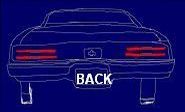| An
octane number is the laboratory measurement of gasoline's ability
to prevent detonation (spark knock)
during combustion. A single-cylinder four-stroke engine, designed
with an adjustable compression ratio, is used to determine the octane
rating. Two pure hydrocarbons: isooctane, rated 100(a very high
knock-resistant), and heptane rated 0 (a very poor knock-resistant)
are blended together to match the performance of the gasoline being
tested. The octane number is the percentage of isooctane added with
the heptane. Once tested, the equation (R+M)/2 is used to find the
average percentage rating. An eighty eight rating on the gas pump
would indicate that an average of 88% isooctane blend was need to
match the gasoline's performance in the test engine. To achieve
a gasoline with a rating over 100 octane, an additive must be added
to pure isooctane. |



